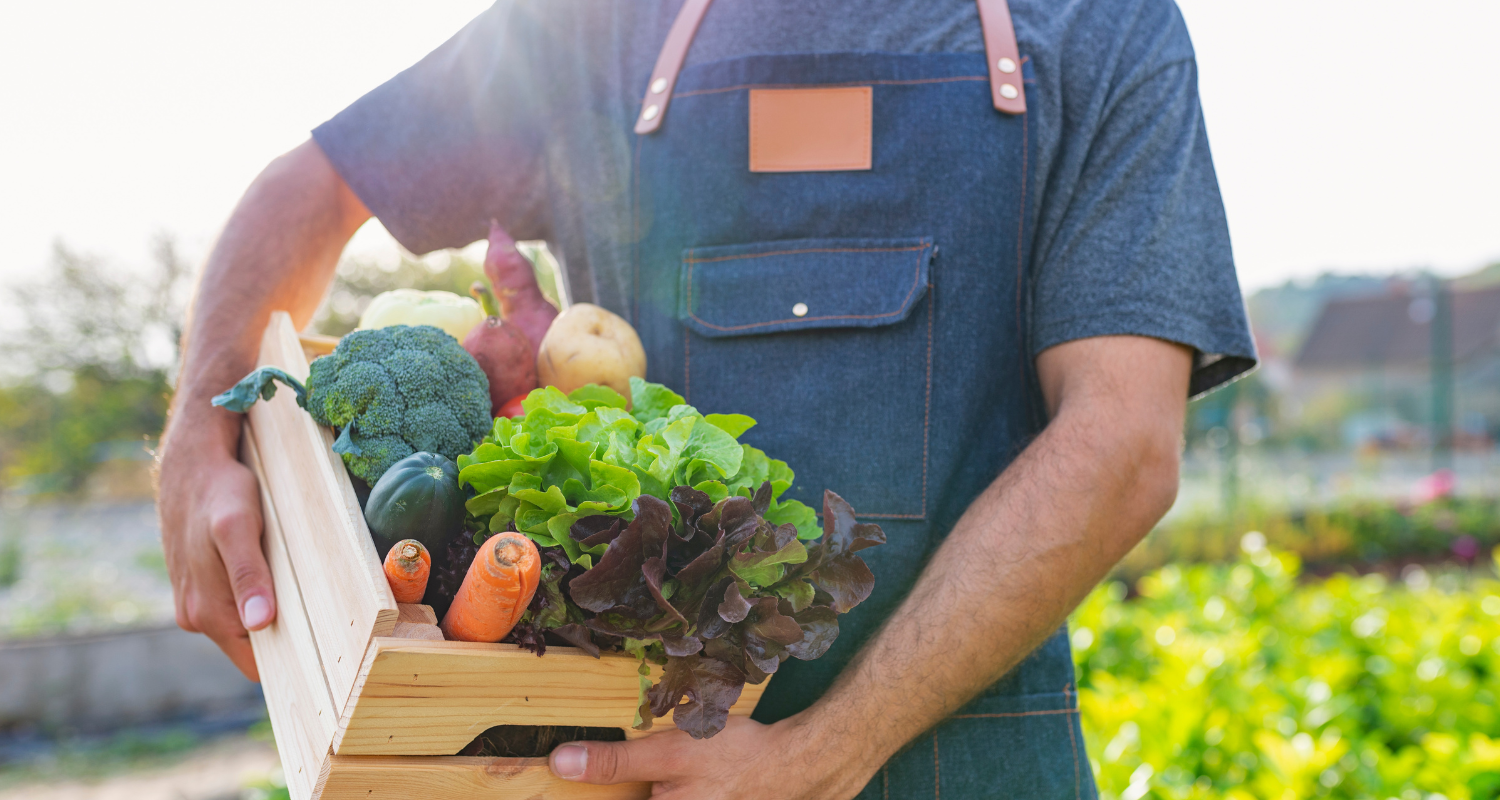
What Pesticides Are Doing to Your Gut (and Why Organic Matters)
What Eating Organic Really Means for Your Gut
You probably already know that organic food is better for your health, but let’s go deeper. It's not just about what organic foods don’t have—it’s also about what they do provide.
Organic food means fewer synthetic pesticides, herbicides, and fungicides—chemicals linked to inflammation, hormone disruption, and gut imbalances. But beyond being “cleaner”, organic food often contains more nutrients thanks to healthier soil, crop diversity, and minimal chemical interference.
This nutrient density matters, especially when it comes to gut health.
From bloating and food sensitivities to brain fog and fatigue, many gut issues today stem from the way our food is grown. And while washing produce helps reduce chemicals on the surface, it won’t remove those that are absorbed into the plant during the growing process—like systemic pesticides and herbicides.
The good news? Choosing organic, even for just your most-used foods, can lower your chemical load and give your gut a better shot at healing and thriving.
The Hidden Impact of Pesticides and Herbicides
Conventional farming relies heavily on chemicals to grow food quickly and prevent pests. But these substances don’t stay on the farm. They find their way into the food system, water supply, and your body.
Here’s how that affects your gut:
- Glyphosate (the active ingredient in Roundup) may harm beneficial bacteria like Lactobacillus and Bifidobacterium—important for digestion, immunity, and inflammation control.
- Chlorpyrifos, a widely used pesticide, has been linked to microbiome disruption and damage to the gut lining in both animal and early human studies.
- These chemicals can increase intestinal permeability (also known as “leaky gut”), trigger chronic inflammation, and interfere with nutrient absorption, even at low levels.
Your gut lining is only one cell thick. Its job is to allow nutrients in and keep harmful substances out. But repeated chemical exposure can weaken this barrier, making it “leaky” and opening the door to food sensitivities, immune issues, and inflammation.
Healthy environments grow healthy food. And healthy food builds a stronger gut.
When the Environment Suffers, Your Gut Feels It
The same synthetic chemicals that disrupt your gut don’t stop with your body—they ripple out and damage the ecosystems that grow and nourish your food. Over time, this weakens the food supply and the gut microbiome it’s meant to feed.
🦠 Soil Microbiome Loss
Pesticides and herbicides destroy beneficial soil microbes, reducing microbial diversity and damaging soil structure. Since plants rely on these microbes to draw in nutrients, chemically farmed crops often contain fewer essential vitamins, minerals, and phytonutrients—meaning your gut gets less of what it needs to thrive.
🐝 Fewer Pollinators = Less Food Diversity
Bees, butterflies, and other pollinators are highly sensitive to pesticides. As these populations collapse, plant biodiversity declines—especially fruits, vegetables, and nuts. This reduces dietary fiber and polyphenol diversity, two key inputs for a healthy gut microbiome.
💧 Water Contamination
Runoff from conventional farms carries pesticide residues into water sources. These chemicals harm aquatic life and expose people to low-level toxins via drinking water and irrigated crops, potentially compounding gut inflammation and microbial imbalance.
🌎 Environmental Microbiomes Matter Too
Soil, air, and water all contain delicate microbial ecosystems—just like your gut. When farming practices disrupt these natural microbiomes, it impacts our ability to grow resilient, nutrient-dense food.
Gut health doesn’t exist in isolation. It’s deeply connected to the health of the environment around you. By supporting organic farming practices, you're not just avoiding harmful chemicals—you’re helping to restore the ecosystems that produce nutrient-dense, microbiome-supportive food.
Healthy environments grow healthy food. And healthy food builds a stronger gut.
How Organic Whole Foods Can Heal Your Gut
Choosing organic isn’t just about avoiding harmful chemicals—it’s about maximizing what your food does contain.
Organic whole foods naturally contain more nutrients and compounds that nourish, protect, and rebuild your gut lining.
🌿 Fiber
Found in organic fruits, vegetables, legumes, and whole grains, fiber feeds beneficial gut bacteria. In turn, these microbes produce short-chain fatty acids (SCFAs)—key compounds that reduce inflammation, strengthen the gut barrier, and help rebuild the gut lining from the inside out.
🌺 Polyphenols
These powerful plant compounds—especially abundant in colorful organic foods like berries, herbs, olives, and cacao—act as antioxidants and prebiotics. They soothe the gut lining, feed beneficial bacteria, and help maintain a balanced, diverse microbiome.
🧂 Essential Micronutrients
Organic crops often contain higher levels of vitamins and minerals due to healthier soil. Nutrients like zinc, magnesium, and vitamin A play critical roles in repairing gut cells, regulating inflammation, and strengthening the gut barrier.
🥑 Healthy Fats
Organic avocados, nuts, seeds, and pasture-raised animal products supply anti-inflammatory fats that support immune function and help strengthen cell membranes—including those that line the gut.

The bottom line: The more organic, nutrient-dense whole foods you eat, the more you support your gut’s natural ability to heal, seal, and thrive.
Small Shifts = Big Impact
Eating 100% organic isn’t always accessible or affordable. But it doesn’t have to be all or nothing. Even small changes can go a long way:
- Choose organic versions of the Dirty Dozen (the most pesticide-contaminated produce)
- Opt for organic animal products to avoid hormone and antibiotic residues
- Focus on buying organic for the foods you eat every day
When you choose organic, you’re not just making a healthier choice for yourself—you’re voting for cleaner water, healthier soil, thriving pollinators, and a more resilient food system for everyone.
Sources
- Mesnage, R., & Antoniou, M. N. (2017). Potential toxic effects of glyphosate and its commercial formulations below regulatory limits. Frontiers in Public Health.
- Gao, B., et al. (2017). Gut microbiota alteration after chlorpyrifos exposure in mice. Environmental Pollution.
- Tsiaoussis, J., et al. (2019). Effects of pesticide exposure on the human microbiome. Toxicology Letters.
- Organic Center. (2020). Pesticide Residue Report. https://www.organic-center.org
- Brandt, K., et al. (2011). Higher antioxidant and polyphenol content in organically grown produce. British Journal of Nutrition.
- Puglisi, E., et al. (2012). Impact of pesticides on soil microbial biodiversity. Chemosphere.
- Benbrook, C. (2009). Impacts of genetically engineered crops on pesticide use in the United States: The first thirteen years. The Organic Center.




Leave a comment
This site is protected by hCaptcha and the hCaptcha Privacy Policy and Terms of Service apply.